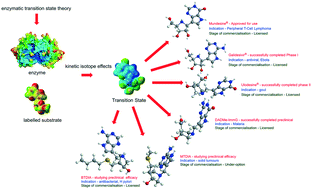The transition to magic bullets – transition state analogue drug design
Abstract
In the absence of industry partnerships, most academic groups lack the infrastructure to rationally design and build drugs via methods used in industry. Instead, academia needs to work smarter using mechanism-based design. Working smarter can mean the development of new drug discovery paradigms and then demonstrating their utility and reproducibility to industry. The collaboration between Vern Schramm's group at the Albert Einstein College of Medicine, USA and Peter Tyler at the Ferrier Research Institute at The Victoria University of Wellington, NZ has refined a drug discovery process called transition state analogue design. This process has been applied to several biomedically relevant nucleoside processing enzymes. In 2017, Mundesine®, conceived using transition state analogue design, received market approval for the treatment of peripheral T-cell lymphoma in Japan. This short review looks at a brief history of transition state analogue design, the fundamentals behind the development of this process, and the success of enzyme inhibitors produced using this drug design methodology.



 Please wait while we load your content...
Please wait while we load your content...